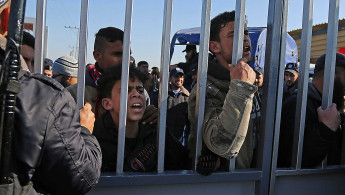Egypt won’t open Rafah crossing if Hamas controls it
A Palestinian source has confirmed that the Rafah crossing, the only border crossing between the besieged Gaza strip and Egypt, will not be opened unless the Palestinian side is staffed by Palestinian Authority employees and no Hamas personnel are present.
“Abbas recently conducted personal communication through his adviser Mahmoud al-Habbash with the Egyptian authorities concerning the crossing and asked for its opening to save the season of the religious pilgrimage of Umrah to Mecca, but the Egyptian answer was shocking as they apologized for not opening it now. Abbas was informed officially that the crossing will not be opened except under the full authority of the Palestinian presidential guards,” the official, who is close to President Mahmoud Abbas, said.
The official indicated that “the Egyptian authorities also requested the presence of Palestinian presidential guards along the border strip separating Gaza and Egypt, provided that they combat all attempts at digging new tunnels to replace those that the Egyptian army had destroyed during the past year and a half.”
Almost permanent closure
| Since the removal of former President Mohammad Morsi, Egypt opens the crossing for a few days every few months. |
Since the removal of former President Mohammad Morsi, Egypt opens the crossing for a few days every few months. It used to coordinate with both Palestinian authorities in Gaza and the West Bank to open it by notifying the Palestinian embassy in Cairo and the authority of “borders and crossings” that reports to the former government of Gaza of its intention to open the crossing, for how many days and the cases who are permitted to travel.
Amidst the talk about the crossing and its crisis, which has reflected negatively on the citizens of Gaza, al-Araby learned from informed sources that “the delegation of the Islamic Jihad Movement, led by its Secretary General Ramadan Shallah, which has been in Cairo for a few days now, suggested to Egyptian intelligence, the PA and Hamas an initiative to open the Rafah Crossing, under the supervision and in the presence of the PA, with the participation of the current employees of the crossing in its administration”.
“The initiative was suggested to Egyptian intelligence. When it was accepted in principle by them it was suggested to both deputies of the chairman of the political bureau of Hamas, namely Ismail Haniya and Mousa Abu Marzouq, the latter being present in Cairo for medical treatment, and when it was received by acceptance by them it was suggested to President Abbas”, the sources added.
Shallah contacted Haniya and Abbas and met Abu Marzouq twice in Cairo. He is waiting for the PA response to the initiative. “Jihad” keeps notably discreet about the outcome of its contacts so far. It has expanded the mission of the visit of its delegation to Cairo to include the file of the strained relations between Hamas and the Egyptian authorities, despite acknowledgement by leading Palestinians that nobody can ease or solve the current crisis amidst the prevailing circumstances.
| The closure of the Rafah Crossing increases the suffering of the people of Gaza, who are subjected to tightened Israeli siege. |
Hamas views that “the reconciliation agreements it had signed with the Fatah Movement stipulate partnership in management and action, not unilateralism”. It accuses Fatah and the PA that they “want to exclude it from political and field landscape by their insisting on the PA monopoly in controlling the crossings and borders”.
Maher Abu Sabha, who was in charge of the Crossings and Borders Authority under the former Gaza government, wrote on his Facebook page that he “would be the first to commit to any agreement on the crossings. Never on any day we have been but servants of our people and we will not be other than that. I wish that to happen today, not tomorrow. He who does not pain for the suffering of the people of Gaza is not one of them and does not deserve life."
The closure of the Rafah Crossing increases the suffering of the people of Gaza, who are subjected to tightened Israeli siege, to which a severe Egyptian restriction was added. The Gaza Strip has two passages to the outside world. One of them is the Rafah Crossing, which is under Palestinian and Egyptian control, Israel has no presence. It is located on the far south of the Strip. The second is the Beit Hanoun/Erez Crossing, which Israel controls and travel via it is blocked except with a special permit from the Israeli intelligence. Very few, all Palestinians from Gaza, are permitted to travel through this crossing. It is considered a “trap” for Palestinians, as many have been arrested, from patients and their companions as well as businessmen and merchants. It is also used to blackmail and trap Palestinians to collaborate with the Israeli occupation.
This is an edited translation from our Arabic edition.





 Follow the Middle East's top stories in English at The New Arab on Google News
Follow the Middle East's top stories in English at The New Arab on Google News
![Netanyahu furiously denounced the ICC [Getty]](/sites/default/files/styles/image_330x185/public/2024-11/GettyImages-2169352575.jpg?h=199d8c1f&itok=-vRiruf5)
![Both Hamas and the Palestinian Authority welcomed the ICC arrest warrants [Getty]](/sites/default/files/styles/image_330x185/public/2024-11/GettyImages-2178351173.jpg?h=199d8c1f&itok=TV858iVg)
